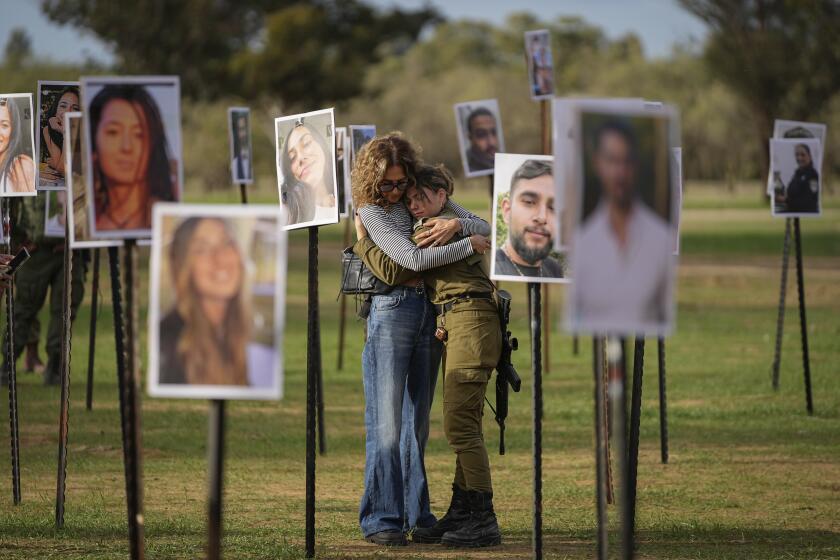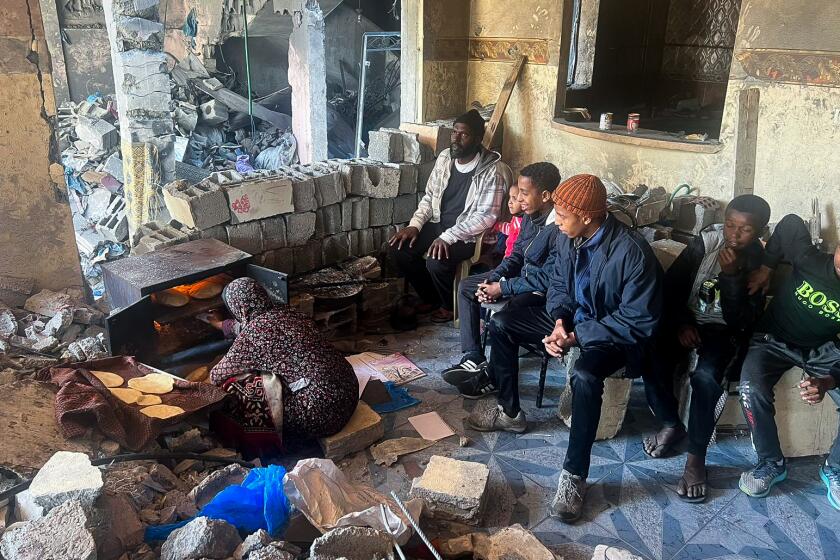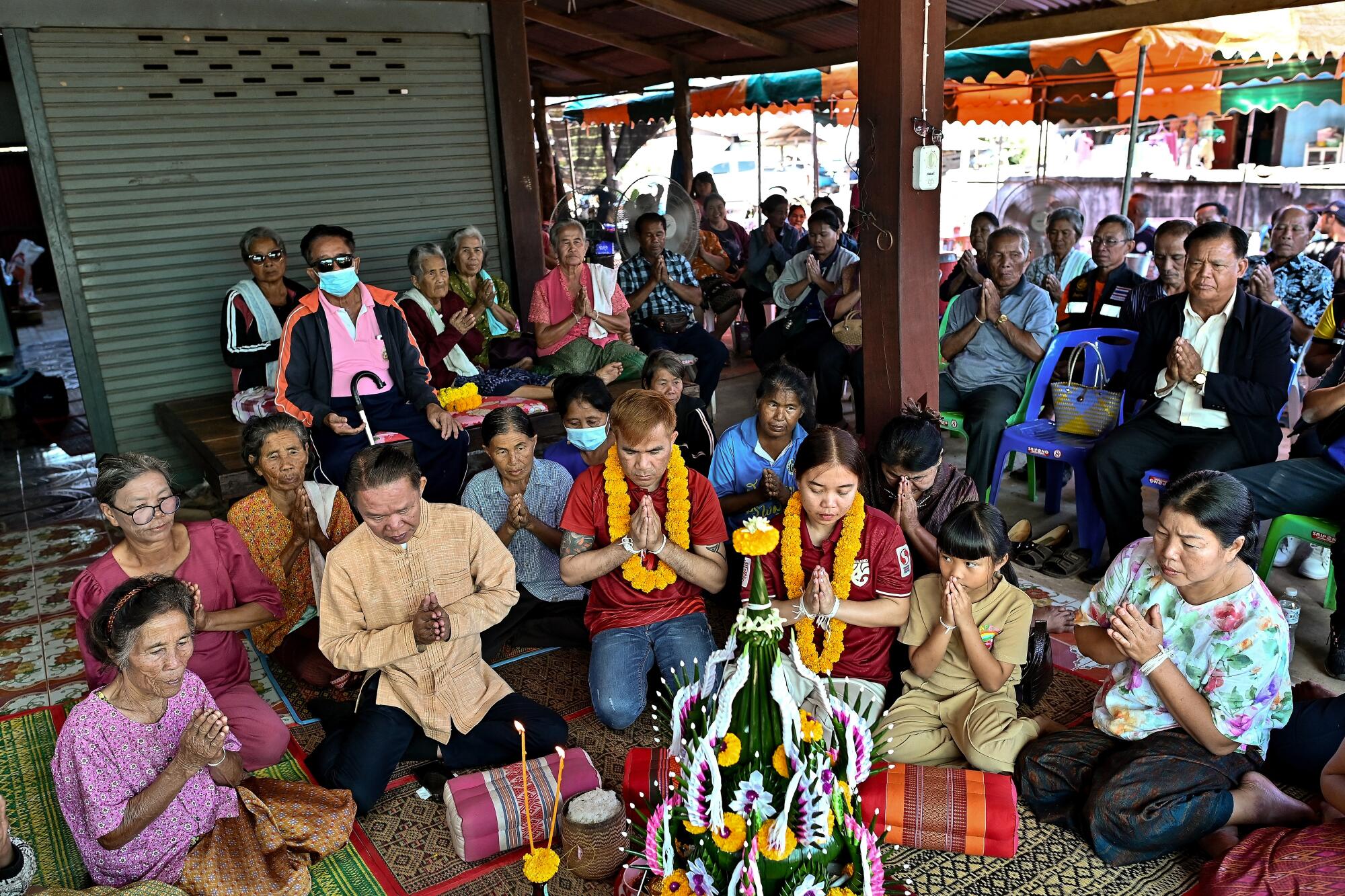
For a Thai farmworker taken hostage by Hamas militants Oct. 7, memories of Israel and Gaza are of love, grief and heartbreak for those she left behind.
- Share via
BAN HAET, Thailand — It was around 5:30 a.m. that Yo’s fiance heard the explosions and shook her awake.
“Let’s go to the bunker,” he said.
Seeking shelter from incoming rockets had become routine to Nutthawaree “Yo” Munkan, a 35-year-old Thai farmhand who worked in a village called Mivtahim in southern Israel, a few miles from the Gaza border.
But on that day, Oct. 7, the bunker by their home was already packed with people and dogs, so her husband-to-be, Boonthom Pankhong, suggested they go to the one at the fruit-packing factory where they worked, a short bike ride away.
They arrived to find one other Thai worker inside. Together, they listened to the distant crack of rifle fire inch closer and tried to swallow their unease.
Yo whispered to Boonthom: “OK, the Israeli soldiers are coming to rescue us.”
But the armed men with severe expressions who appeared in the doorway were wearing military uniforms different from the olive drab fatigues she had seen on Israeli soldiers.
“That’s when I knew something was wrong,” she recalled.
Yo explained, in frantic Hebrew, that she and Boonthom were from Thailand and worked at the fruit-packing factory. The men grabbed them anyway and loaded them onto a pickup truck. The attack on southern Israel was in full swing.
Even now, Yo cannot bring herself to describe what she witnessed on the drive over.
“We weren’t blindfolded,” she said. “I saw everything.”
The truck arrived in the Gaza Strip to more pandemonium — “missiles and gunshots flying from every direction.” Their captors shouted and gesticulated for them to run for cover.
Yo and Boonthom took off in different directions.
And just like that, he was gone.
::
They had met at the fruit-packing factory about four years ago, not long after Yo arrived in Israel.
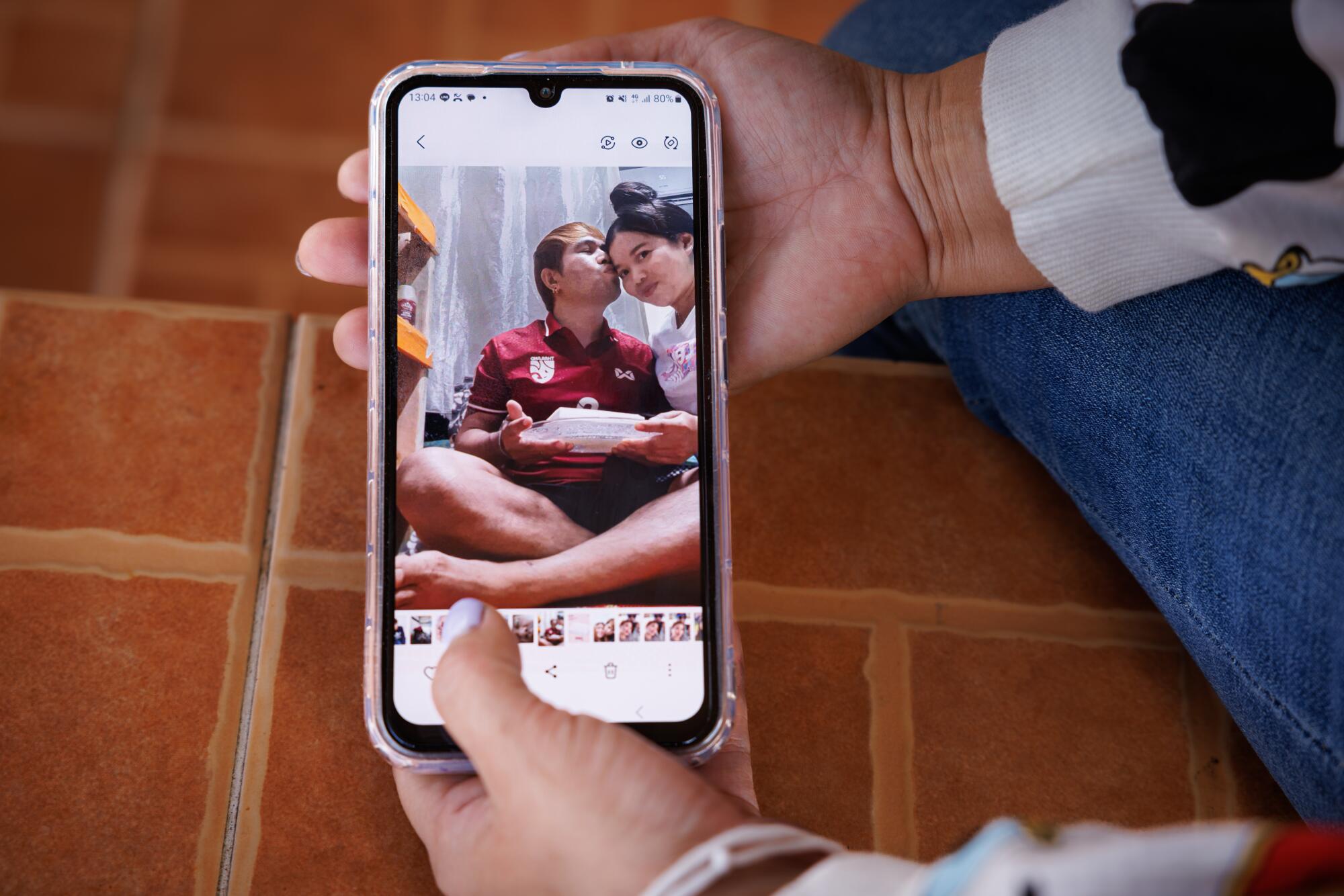
Both were from poor farming families in northeastern Thailand and had come to Israel for the same reason: to pay off their families’ debts, which amounted to a lifetime of work on Thai wages.
It was a story common to the 30,000 Thai laborers in Israel, 6,000 of whom worked near the Gaza border.
Yo had been working since she was 17: first at a jewelry factory in Bangkok, then on a beetroot and spring onion farm in Australia followed by a stint growing cucumbers in South Korea while she was pregnant with her daughter Mina. With the father out of the picture, she left Mina with her mother, who was already caring for Yo’s older son.
This moment in the Israel-Hamas saga can be glimpsed in the fate of two fathers, strangers who share misfortunes brought on by larger powers and are now left to find their way
Boonthom had noticed her packing the harvested fruit — a turnip variety Yo describes as a “cross between a potato and an apple” — and had been love-struck. He was gentle and hardworking, so Yo had loved him back.
“He didn’t speak much but he showed through his actions,” Yo said. “I felt safe around him.”
Things moved fast, and within a month or two, they vowed to be together. Despite the lack of a marriage certificate, they regarded each other as husband and wife.
They planned for a future together after they had each paid off their family’s debts: buying their own plot of land in Yo’s hometown and starting up a chicken and organic vegetable farm.
On Saturdays, to supplement the $1,500 they each earned every month at the factory, they biked around together looking for side jobs, offering their services to any farm owner that needed extra workers.
Working in greenhouses in the dry heat of southern Israel was suffocating, but Yo grew to love her life.
“I’ve always loved farming,” Yo said. “It’s not easy to deal with plants. Once it grows a stem, you have to tie it to a support so it grows in a certain direction. But it’s very satisfying to see the result when that succeeds.”
In a line of work where bad employers and poor labor conditions are common, Yo considered herself one of the lucky ones. Her supervisors at the turnip-packing factory had welcomed her like family.
One of them had been an Arab man, about 40 years old. Was he Palestinian? In retrospect, Yo thinks so, although she can’t be sure — she had never thought to ask.
On holidays, the man would cook extra food for her and Boonthom: lamb, potatoes, peppers, bread and sauces whose names she cannot remember. He introduced them to his wife, who adored them.
“Of all of the foreigners I met during my working life overseas, he made me feel the most at home,” Yo said. “I liked him a lot.”
::
On her first day in Gaza, Yo realized that she had gotten her period and asked one of her captors for sanitary pads, which he brought.
She asked where she was.
“You are in Gaza,” the man replied.
“What is Gaza?”
“It is Palestinian land.”
Until then, Yo had given little thought to the fragile politics of the region. The occasional rocket flying overhead had seemed to her simply a part of the landscape, distant from the questions of her own livelihood and survival.
At first, she said, she was kept in a house, along with several other hostages.
But as the Israeli military began its bombing campaign of Gaza, the building would judder dangerously with every nearby hit. The fear that Boonthom had come to harm gnawed at her.
“I had never been so scared in my life,” she said. “All I could do was pray.”
After two weeks, Yo noticed that the explosions were getting closer. Then, during one particularly hectic episode, someone hoisted her on his back. “Everything happened so fast,” Yo said. “The next thing I knew I was underground.”
In the section of the dimly lighted and humid tunnel where they had been taken, Yo was the only Thai in a group of five or six others, getting by with fragments of Hebrew and English.
After about three weeks, the group Yo was with came into contact with another group that was being relocated. It included several other Thai workers, and the guards allowed them to stay together. But none of them had heard anything of Boonthom.
The guards, visibly tense during the period in the house, seemed to soften up once they had made it into the tunnel. They were dressed in civilian clothes, unarmed and unmasked.
They spoke little, but would answer when the hostages asked for the time or date. There was no physical abuse, recalled Yo, and they were treated with respect.
Some of their captors were kind, taking care to make sure they had enough food, which mostly consisted of bread. Others were brusque, stingier with the rations — sometimes days with just a piece of bread. Each day Yo apprehensively waited to see who would be in charge of guarding them.
The explosions now sounded more muffled and faraway, but the fear of being bombed stayed.
“I could tolerate hunger or physical discomfort, but not the feeling of not knowing what happened to Boonthom,” she said. “It felt like my heart was being ripped out, and I lived with that feeling the entire time.”
A chance friendship provided snatches of distraction. One of the hostages in Yo’s group, an Israeli woman named Danielle Aloni, had been abducted with her 5-year-old daughter, Emilia. One day, Aloni approached Yo to introduce herself.
In a mixture of Hebrew, English and hand gestures, the women talked about going home. Yo taught Emilia how to count to 10 in Thai. To stay active, the three of them paced around the room.
Then on Nov. 23, their captors told them that they would be released. At first, Yo didn’t believe it; they had made such promises before.
But the next day, they were escorted out of the tunnel, Danielle and Yo trailing behind Emilia. A car picked them up outside.
Boonthom was waiting by the Red Cross bus near the border. After nearly two months of captivity, he had lost weight — just as she had — but was otherwise in good shape. Relief washed over Yo. “We made it,” she told him. She squeezed Boonthom’s hands as they began to recount their stories to each other.
At the Israeli hospital where the Thais were taken to be treated, a visitor came looking for her. It was her Arab supervisor and his colleague. They hugged her tightly. There were no debriefings with the Israeli government, Yo said.
After the Oct. 7 attack, around 9,000 Thai workers — most of them from the area by Gaza — had evacuated the country, sending Israeli agriculture into its own state of emergency.
The turnip-packing factory had lost all but five of its 50 Thai workers. Her supervisors understood that, for now, Yo would be returning to Thailand to be with her family. Still, they asked, would she consider coming back in the future? They needed her badly.
::
Yo had reemerged into a world permanently altered, her place in it no longer the same.
In her absence, she learned, false rumors about her had proliferated — that she was the unnamed female foreign worker who had supposedly given birth in captivity, alluded to in a letter that Israel’s first lady, Sara Netanyahu, had sent to Jill Biden.
“Once I found out about that pregnancy thing, I just cried,” she said. “Watching the news and social media has been very upsetting.”
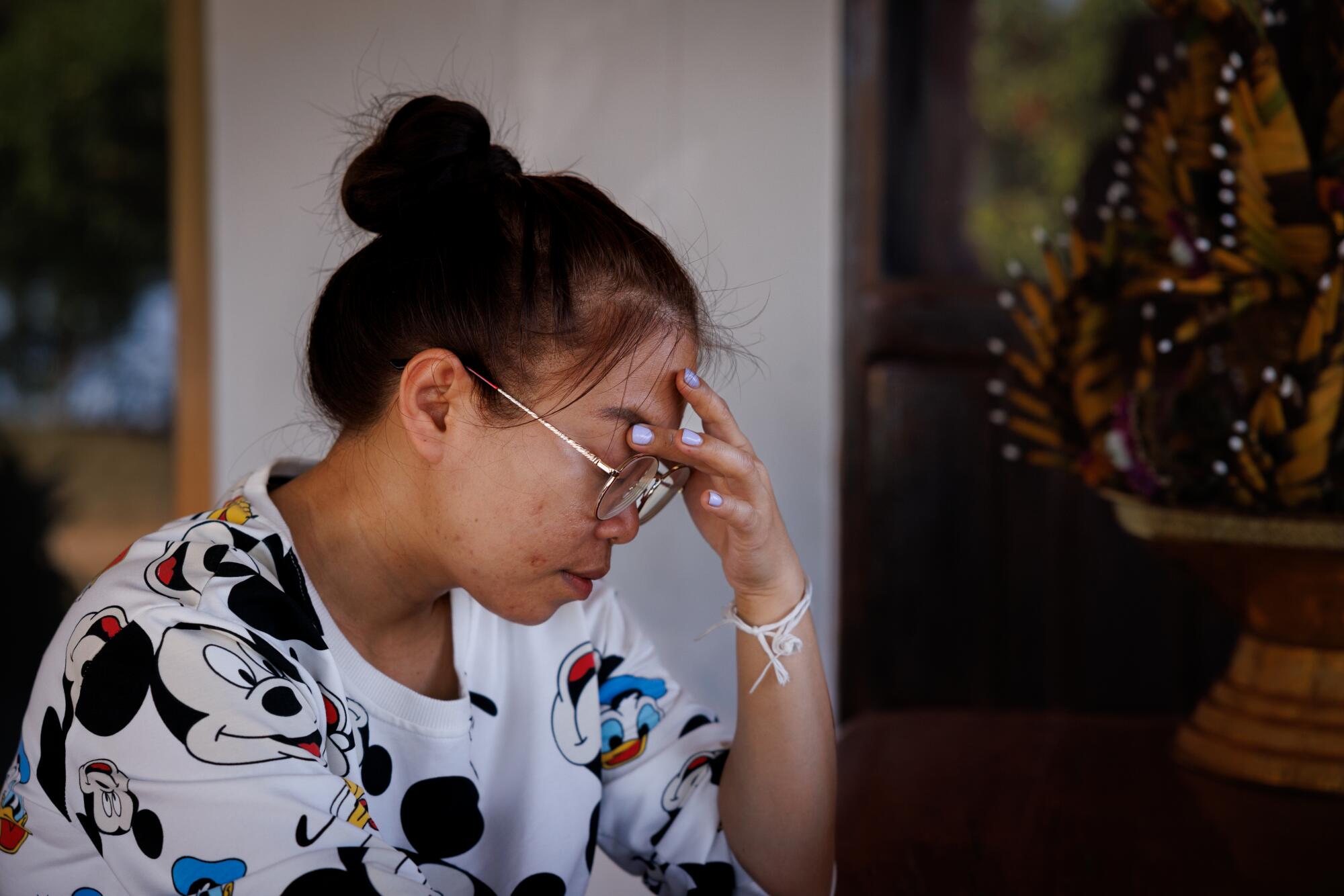
It has been just weeks since she returned home, her first time back in four years. But almost immediately, she has been stretched thin by demands on her time and attention.
On her wrist was a sai sin — a loop made of white string that she had received at the homecoming ceremony her village had thrown for her the week before. It had been blessed by a monk and was meant to offer her protection.
The ceremony had been a costly and elaborate affair for which she had to keep up a respectable public face, despite suffering from nightmares — in which she is back in the truck rattling toward Gaza — nearly every night since returning home. That had been followed by another for Boonthom, who was recently ordained as a monk and left to spend a week at his local monastery.
About 110 hostages, including 23 Thais, were released in a hostage-for-prisoner swap during the weeklong cease-fire between Israel and the militant group Hamas, which has sought the release of some of the 7,000 Palestinians currently being held in Israeli prisons — many of them children detained for offenses such as throwing rocks at Israeli soldiers and oftentimes without due process. More than 100 hostages are still being held in Gaza, with as many as nine believed to be Thais.
But the few hostage testimonies that have been made public so far have been piecemeal, in many cases conveyed secondhand through family members. Some have reported beatings and death threats, while others recall generally humane treatment and having been fed relatively well — on chicken, canned foods, tea and sweets.
As the Palestinian militant group Hamas frees more hostages amid a temporary truce with Israel, a harrowing glimpse of captivity in war-torn Gaza emerges.
In the absence of a full and coherent picture elsewhere, the interview requests to Yo have been relentless. That has been exhausting too, to be repeatedly mined for information that might provide the clarity the world craved, for a taste of her pain.
“I just want to go back to a normal life,” Yo said.
Just after noon, as though to illustrate her point, a local news crew arrived at their gate, led by a young woman in round sunglasses who strode into their yard, holding up a microphone. Yo’s mother, Boonyarin, rushed out to intercept them.
Then Yo’s phone rang. It was Boonthom, who said a different news crew had barged into his monastery, asking for an interview.
“This is so rude,” Yo told her mother. “They don’t respect me, they are constantly invading my privacy.”
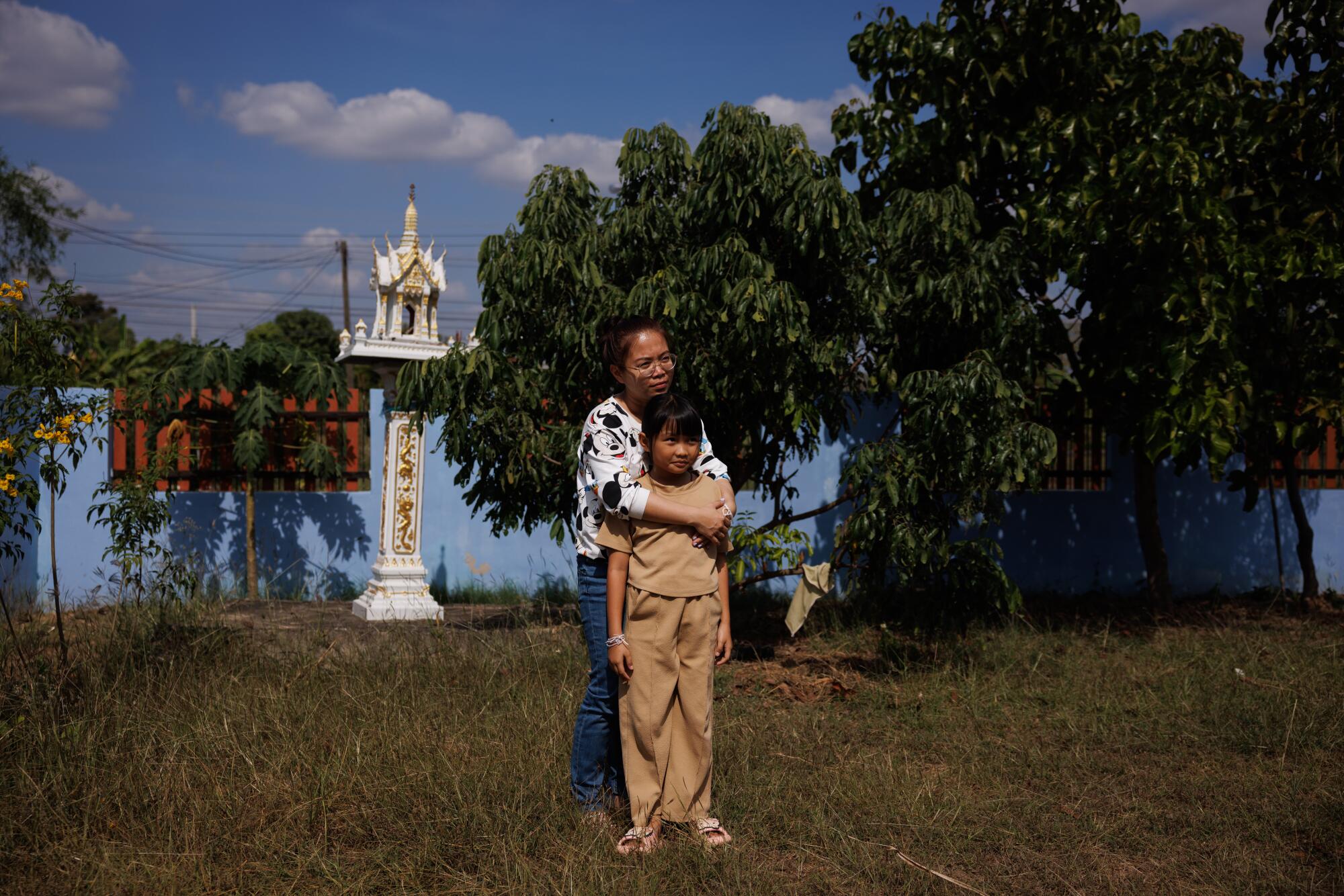
The news crew had tried to appeal to Boonyarin by saying they had to fly back to Bangkok that night, but she shooed them off. They loitered around in the dirt driveway, evidently hoping she’d change her mind.
Yo glanced at them, growing upset.
“It’s always the same question. Nobody does their homework. Nobody bothers to ask the right questions,” she said.
Even the interviews that are conducted tactfully, by well-meaning journalists, drain something from her.
The inevitable questions about the scenes of violence and death pick at still-fresh wounds. These she cannot bring herself to answer.
“It’s not that I don’t want to give information,” she said. “I just don’t want to revisit those memories.”
::
The Thai government has offered mental health services to returning hostages, and it sometimes occurs to Yo that talking through her experiences in a more composed setting might do her good.
But wading around in the past or future is a luxury that has not been afforded to her. Poverty, she said, forces you to live only in the present. Instead, she has sought refuge in the domestic tasks that restore her sense of order and provide simple joys, such as cleaning.
Now that she is out of work, the financial pressures are bearing down heavier than ever. There are still payments to be made on the car and house. All of their possessions in Israel — including a combined four months’ worth of wages in cash that the couple had been planning to send home — were incinerated in the Oct. 7 attack.
Meanwhile, the payouts she has received from the Israeli and Thai governments so far have added up to around $600.
“That’s not even enough to cover expenses,” Yo said.
Earlier that morning, Yo had visited the regional labor office in the city with her mother and daughter to apply for unemployment benefits — which would pay $143 a month — and a one-time payout of $430 that the Thai government is offering to workers returning from Israel.
On the drive back, they received a phone call informing them that their electricity was being cut off because of unpaid bills.
But it is no longer just financial worry occupying Yo’s thoughts. Her mind keeps turning to the hostages who still remain and the Palestinian children dying from Israel’s continued assault on Gaza.
“The image of people losing their lives still flashes in my head. They will haunt me for the rest of my life. But none of this does anyone any good,” Yo said. “I feel pain every time I think about the children in Gaza. They remind me of my daughter.”
‘I just don’t know where we’ll go.’ It’s a question Palestinians ask over and over in Gaza as Israel ramps up bombardment after Hamas truce collapsed.
Mina, who is 9, has also inherited the generational burdens of her family. One day, this family will be hers to support. But her future, at least, still feels wide open.
“I recently sat her down and told her: ‘Once you turn 15 or 16, you need to start learning English so you can go study abroad,’” Yo said. “It doesn’t have to be English. She can study Chinese and go to China. As long as she has a better future than me.”
Until then, there is still much for Yo to do. She and Boonthom will officially get married. They have not yet saved up enough to settle down in Thailand, so at some point the two will head back out to work.
Israel? Maybe, if things calm down. But Yo would not mind going back to Australia either.
The news crew had finally given up and left, and the three generations lingered on the porch, sharing a fleeting moment of normality.
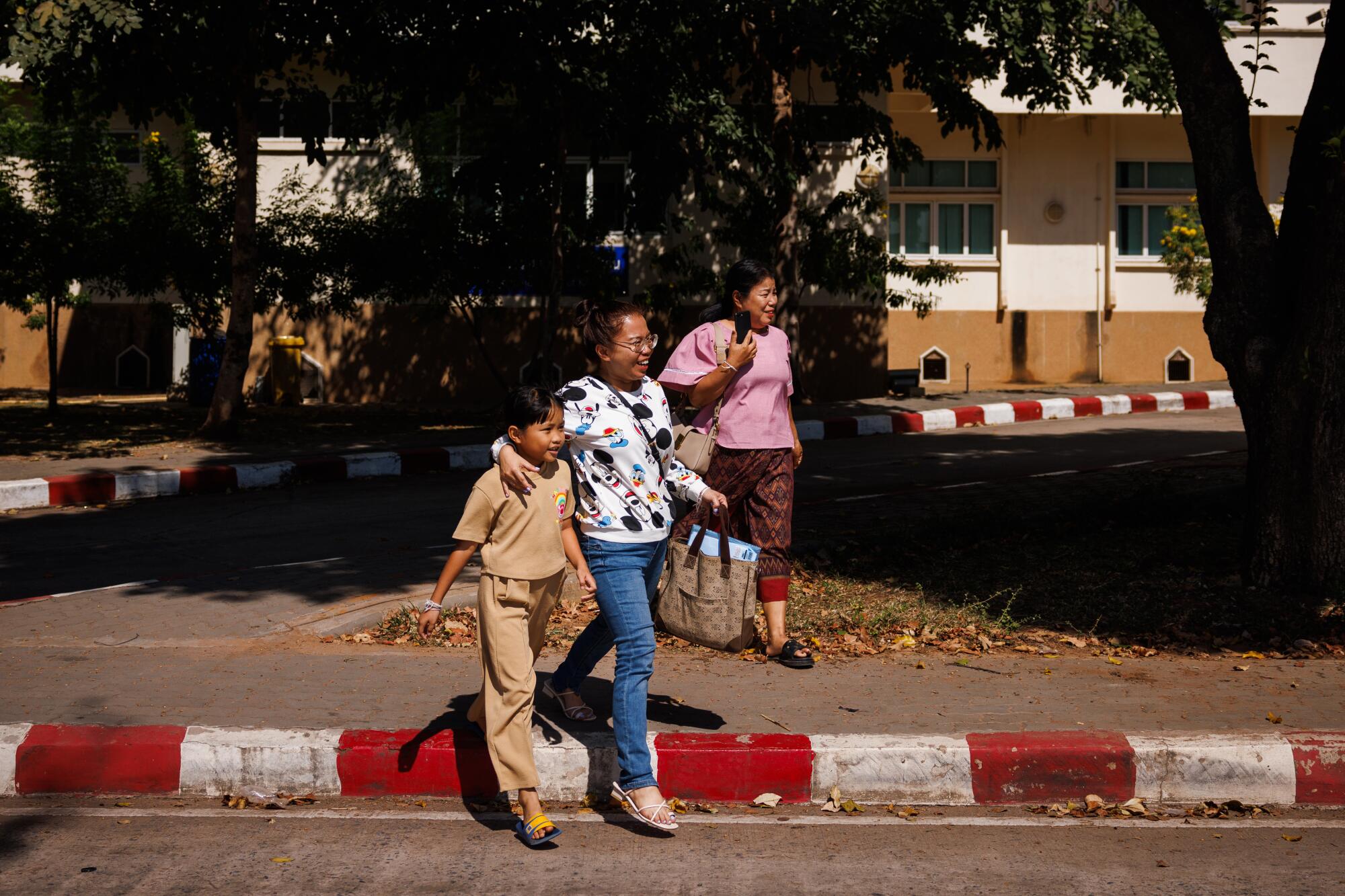
Yo pulled out her new phone. Her old one had been lost on Oct. 7.
“It’s OK, I will start new memories with this phone,” she said.
She had managed to salvage from Facebook a few photos of her and Boonthom’s once-happy life in Israel. She flicked through them a little wistfully, disappearing for a while into the past.
Special correspondent Chaiyot Yongcharoenchai in Ban Haet contributed to this report.
More to Read
Sign up for Essential California
The most important California stories and recommendations in your inbox every morning.
You may occasionally receive promotional content from the Los Angeles Times.

